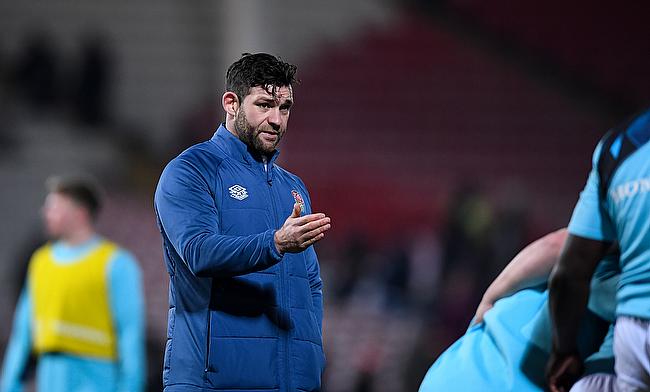Nathan Catt: 'Success is can we get world-class front row players, world-class scrummagers through the system?'

Catt joined the RFU from Bath Rugby on a full-time basis last year
©JMP via RFU Collection
England rugby’s new scrum pathway coach, Nathan Catt, is aiming to produce ‘world-class scrummagers’ as he heads into his first season in the role.
Catt played 170 times at loosehead for Bath over a 12-year playing career that included an England Saxons appearance against Portugal and a call-up to a training squad by Eddie Jones in 2016 before injuries forced him into retirement in 2020.
Since then, he has forged a coaching career through Bath’s academy pathway system, with experience at their affiliated ACE school - Beechen Cliff - and BUCS Super Rugby side Bath University, before joining up with the England U20s for their 2023 Six Nations campaign.
He was given a full-time position as England U20s pathway coach in November last year - a role that spans across both the men’s and women’s set-ups - and at just 36 years old, he adds to the youthful exuberance that typifies the England coaching reformation since Steve Borthwick’s introduction.
What is success in the role?
Speaking exclusively to Talking Rugby Union, Catt laid out his measures for success in a bespoke role that can be considered a blank slate for a man who has an infectious love for all things scrummaging.
"For me success, men's side, is ultimately can we get world-class front row players, world-class scrummagers, through the system? That has to be success," says Catt.
"The second layer of that is we want to have effective, dominant scrummagers at 20s and 18s. You may have to give a little bit for the bigger picture. I think success is, in let's say seven or eight years, we're starting to really put through some world-class scrummagers.
"For the women's side, slightly different because I'm going to be working with the Roses. That has to be sooner, that's not a seven-year project. Success is how we can control the scrum, how we can apply force to control the scrum from the Roses’ perspective. Then working your way down again through the pathway, the same objective is to make world-class scrummagers for the Roses.”
Bringing it back to the men’s sides, finding the right formula in the scrum is something which Borthwick will be looking to concoct during the upcoming Six Nations.
The England boss has gone with the experience of Dan Cole, Joe Marler and Ellis Genge combined with the likes of Joe Heyes and Beno Obano - who are aiming to light the fuse on their respective international careers - for now, but behind them is some promising emerging talent.
Marler’s club teammate Fin Baxter (Harlequins) is one to watch while players such as Sale Sharks’ Asher Opoku-Fordjour has caught the eye with some outstanding displays in the Premiership and Champions Cup.
“There are a few [young prospects], I don't really want to name-check them though because they're all youngsters,” Catt admits. “I'll use Asher because he's playing pretty well in the Prem at the moment.
“Asher was the loosehead for the U20s last year, an U19. He's obviously gone pretty well. I don't want to start saying; 'This lad is going to be really good' because it's so hard as a youngster.
“Ultimately for the front row lads, it's going to be how well they go and scrummage at senior level. A U18s,19s scrum is very different to scrummaging in the Premiership. For those guys, it's going to be how well they can adapt to those senior scrums.”
And the ‘senior scrum’, in relation to England, is never too far away from being highlighted with many attributing their losses in the Rugby World Cup final in 2019 and in the 2023 semi-final against South Africa to weakness in that area.
Fair or not, Catt himself won’t get caught up in the frenzy that has followed that fateful semi-final back in October.
His love for scrummaging and for player development made taking his role a “no-brainer”, and Borthwick’s focus on incremental improvement is institutional.
“I don't see it [the scrum] as a 'fix'. I just see it as how we make players better,” says Catt.
“All I want to try and do is maximise our players coming through the pathway. Give them the best chance to go and excel for England seniors and in the Prem. I don't like 'fix’ because that implies broken. Do I think it could be better? Yeah probably, but there's not much that can't be better in life.
“I don't want to see when this comes out 'Nathan Catt's going to fix the scrum'! It's how we make it better.
“That’s what this role has been made for. It was in the pipeline a long time before [the World Cup]. My main objective is, in seven years time, if we've got a world-class scrum and some of them have come through the pathway, then it is probably going okay.
“That has to be our, from the men's side, our objective.”
As a result, the alignment between Catt’s pathway role and the senior side is well established.
“I've spoken with Tom Harrison [England’s scrum coach] a lot to run through the players we’ve got coming through,” Catt adds. He's been excellent from what we're doing from session design to how we view scrums. It's good to have somebody else to bounce ideas from and to have a second pair of eyes is always helpful.
“It's just now trying to put it all together and deliver. Then we'll probably look back at it in a few months and go; 'We need to do this, this, and this needs to improve.”
Fostering a love for scrums
But how will they deliver is a ubiquitous, and important, question surrounding English rugby.
First, rekindle an appetite for scrums. Where once the national team was built around granite foundations of scrum machines such as Jason Leonard and Phil Vickery, and Premiership dynasties were created on the back of players like Julian White or Tim Payne, scrums, in some quarters, have become a lamented part of the game.
And that anti-scrum epidemic is something Catt is hoping to eradicate from England’s next generation of forwards.
“It’s really important. We want to try and get the lads loving scrummaging again”, says Catt.
“We want to make it exciting”, he continues. “We want them to come away thinking; 'Right, how can I get better at scrummaging? I loved learning about x, y, z that I did in the front five camp and here's a load of practice that I can go and work on at home and back at club.’
“It is about seeing the passion and developing their love of scrums.”
One such way Catt and the RFU are seeking to do this is through the above-mentioned front five forwards specialist set-piece camps. The RFU held their first of these camps last September where Catt, as well as other Premiership pathway coaches, were present.
Describing the camp’s purpose, Catt said: “It’s guided practice, trying to make them want to scrummage and enjoy scrummaging. Enjoy the contest of it.
“We did a lot of stuff with the boys around 'here's some gym exercises' because if they're at school they might not be doing those gym exercises. Stuff they can take away. There definitely will be [more camps].”
Building on good foundations and teaching specifics
That ‘constantly learning’ approach filters into another element of Catt’s thinking as he hopes to use proven products of England’s pathway to teach the new generation their scrummaging specifics.
“One way for youngsters to improve is to try and get a best model practice. So it might be 'I want to scrummage like Joe Marler'. I'd go 'What about Joe Marler, specifically, do you like?'.
“They're then starting to build a mental model of how they want to scrum. 'Okay, so what's Marler doing differently? Right okay his right foot's actually a little bit further back and his bind starts a bit higher and his neck's neutral.' They would start seeing that these are effective characteristics that they want to scrummage like.”
With Catt’s role being a full-time job, it means he can devote himself to an extreme amount of detail like this.
“I spend loads of time with the guys trying to show them”, adds Catt.
“For example, I record their set-up, then I'd make a couple of tweaks for them, then get them to set up again, then get them to verbalise what they’ve done so they’ve got that first video of their old way, then they’ve got a video of what they’ve practised, then they’ve got a verbal video of how they’ve got there. Then they can refer back to it.
“For me, everything in scrummaging is around feel, so I then go; ‘Right, this is what your best currently looks like. Now try and get repping, try and get 10 reps a day, so that every time you come into a scrum you're not having to think about your set-up’.
“It just becomes natural and that's just the way you scrummage. It has to be engrained. They have to know what it feels like.
“I think the other key is finding the right level of challenge for the players coming into their 18s, 19s, 20s and beyond, as to where they are [playing] so they're not comfortable, but they're obviously not being sent out to go and get absolutely hammered every week.
“It's finding that sweet spot which is easier said than done of course, and the logistics play a big part in that. Boys need to be playing consistently, with hopefully decent support from whatever support networks they've got at the correct level.”
And with Catt heading things up from a pathway perspective, the future of England’s scrum does look bright.



.jpg)





